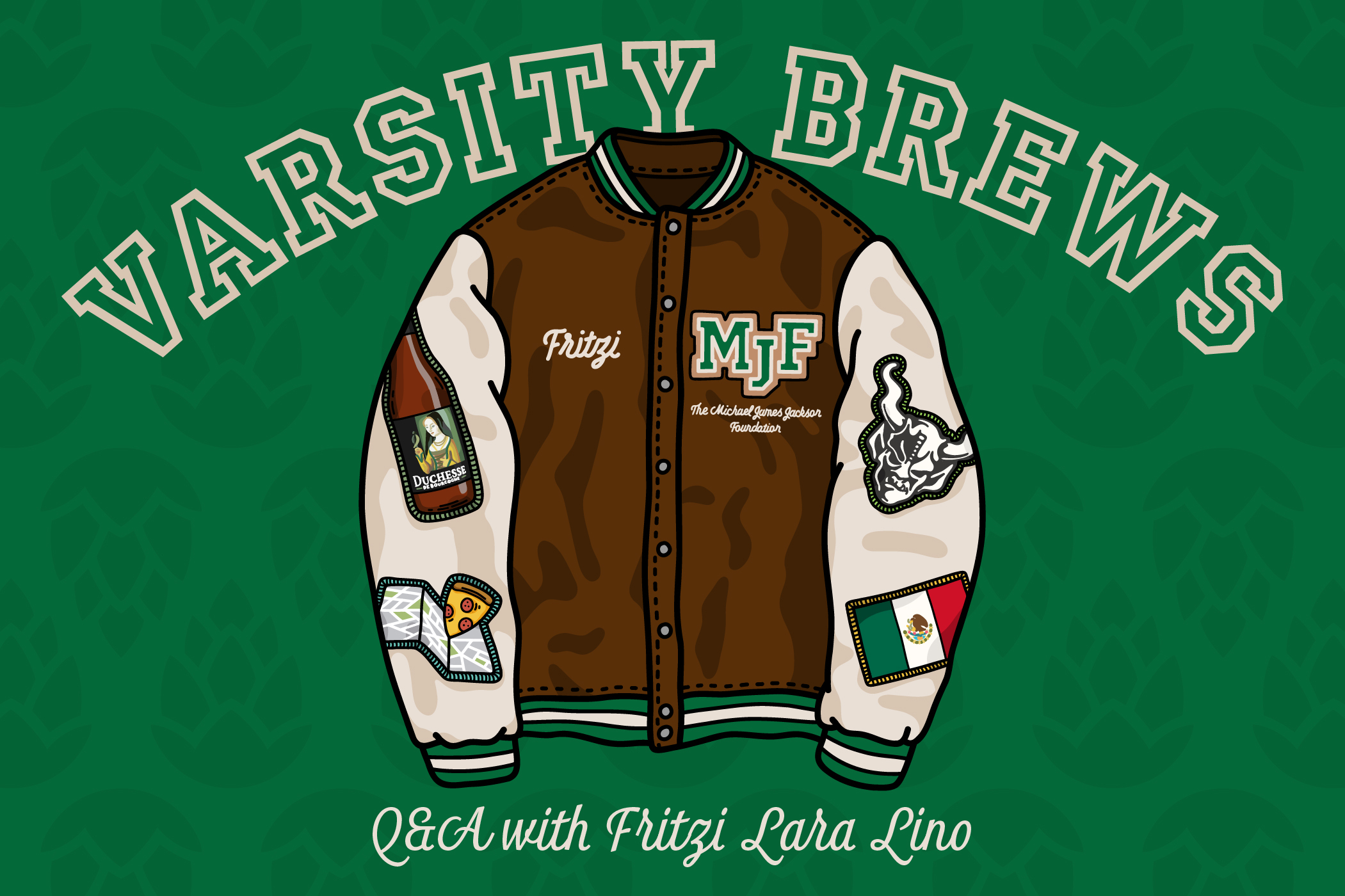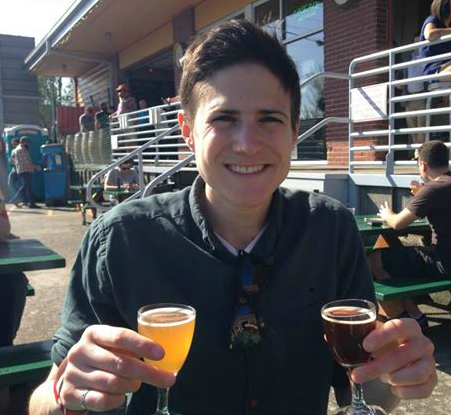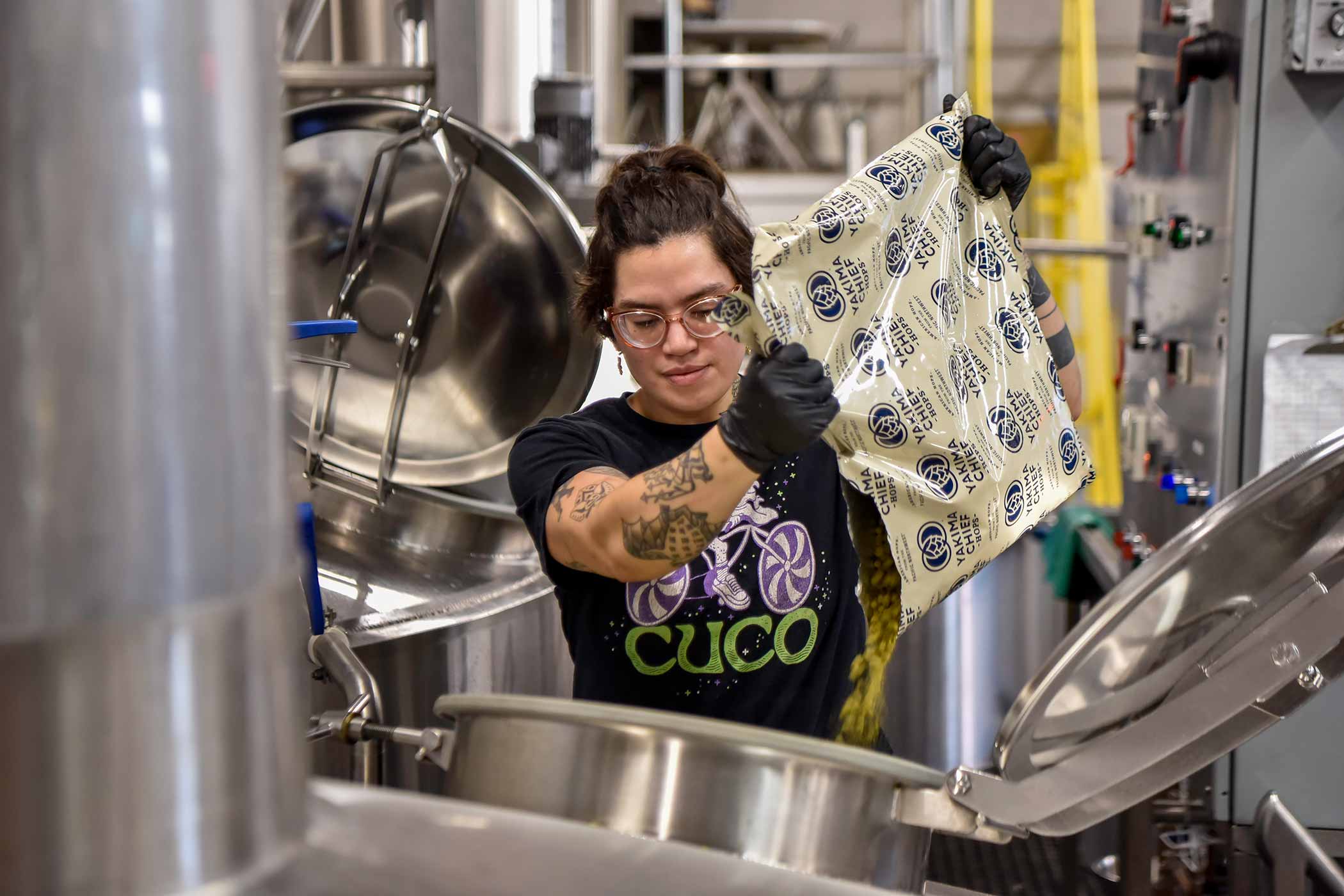Shop
Varsity Brews: 17 Questions With Fritzi Lara Lino
A new Hop Culture Q&A series.
Like This, Read That
This year, we introduced an entirely new series called Varsity Brews. With each quarterly piece, we profile a different scholarship awardee from the Michael James Jackson Foundation for Brewing & Distilling (MJF).
Remind Me, What Is the MJF?
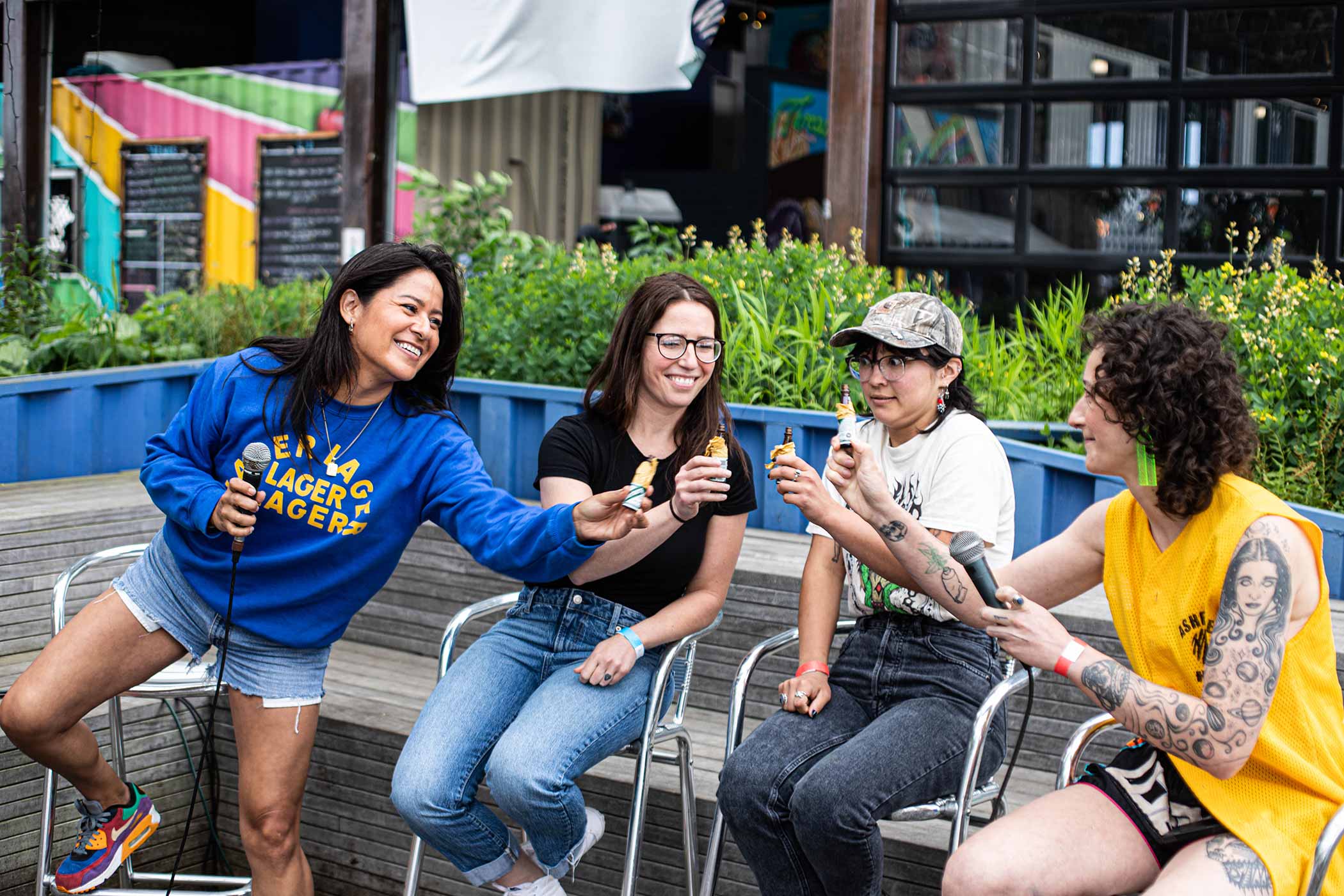
Scenes from Log Jammin’ III in 2023 with the MJF Director of Operations Breeze Galindo on the left | Photography courtesy of Jose Manchola (@yankeerunner77)
Named after Michael James Jackson, one of the world’s most renowned beer and whiskey writers, the foundation aims to make the craft beer industry more diverse, just, and equitable by offering scholarship opportunities to underrepresented communities.
“Michael Jackson pushed me into rooms where people were not prepared to see me and used the fact he was a god to whom no one could say no,” MJF Founder and thirty-year Brooklyn Brewery Brewmaster Garrett Oliver has told Hop Culture. “Who is he, and what is he doing here? That is what I heard in England while judging the Champion of Beer of Britain final panel in 1992. … If you’re a Person of Color, you have heard that whispered or felt that from behind a bar.”
The MJF aims to rewrite that narrative, equipping People of Color in the industry with the tools and education to advance despite the industry’s systemic barriers.
Since starting the foundation in 2020, Oliver and the MJF have provided funding for scholarships for fifty different People of Color in the industry.
These are educational opportunities that often come with a tremendous cost.
“What does a certificate cost? Four thousand dollars? Twelve thousand dollars? Twenty-three thousand dollars? Thirty-three thousand dollars?” remarked Oliver, admitting that even when he sat in the brewmaster chair, he required any new applicant to either have two to three years of experience or a certificate. “I thought I was doing the right thing, but it turned out that no Brown people ever showed up.”
A scholarship from the MJF covers those expenses and helps ensure that Black and Brown people can attend those interviews or further establish their businesses.
“If you don’t know how meaningful that is, ask them; ask me,” said Oliver. “I wished to god there was someone there for us. We have their back. And that’s important. You have their back. This is a beautiful thing.”
So, we took Oliver’s advice.
Editor’s Tip: See the rest of our Varsity Brews series, where we interview Gali Hernandez, Anthony Rahí Jaquez Moreno, Stefano Annicchiarico
Stone Brewing’s R&D Brewer Fritzi Lara Lino
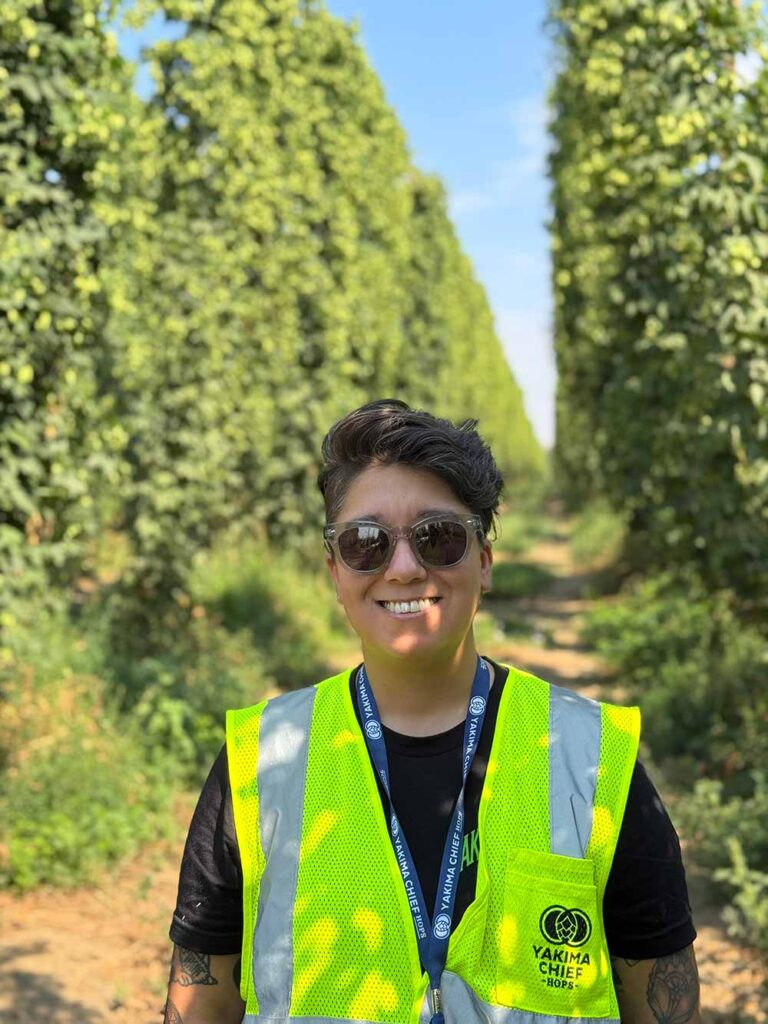
Photography provided by Fritzi Lara Lino
Queer, first-generation Mexican American R&D brewer Fritzi Lara Lino never thought she’d actually pursue a career in beer.
The Cal State LA Art major wanted to become a museum curator.
“But I got disillusioned with that whole field,” she admits, saying the only thing that stayed constant during a time of career turmoil was “grabbing a beer with my best friends and with my now wife.”
She adds with a grin, “Good times were always had.”
When Lara Lino and her partner moved from the Bay to San Diego to be closer to her mother-in-law after her cancer diagnosis, she had a chance to take some of the load off her father-in-law.
Oftentimes, they’d go for a beer.
While out at a brewery together one day, Lara Lino says her father-in-law turned to her and said, “You know, you could make this.”
She calls that the “lightbulb moment.”
One homebrewing class later, Lara Lino turned to her father-in-law with an answer. “I’m going to do this.”
After applying everywhere in San Diego from Modern Times to AleSmith, Stone Brewing hired her as a cellar tech.
“Since then, I’ve just tried to learn as much as I can,” says Lara Lino, who also worked as a cellar lead at Boochcraft before returning to Stone in 2021 as a senior brewer 1 and eventually joining the R&D team as an innovation brewer.
She admits that she learned as much as she could on her own until she discovered MJF.
Earning a Sir Geoff Palmer Scholarship Award for Brewing, Lara Lino told us when we spoke that she planned to finish her program at U.C. Davis that very week.
“I’ll have my Master Brewer Certificate in my hand very soon,” she said excitedly.
Finishing school is just the start for the brewer who hopes her experiences as a Queer, first-generation Mexican American woman can inspire others.
Lara Lino now leads Stone’s Pink Boots Collaboration brew days, a responsibility passed down to her from her friend and fellow coworker, Laura Ulrich, who is now the materials planner and buyer at Stone Brewing and the former president of the Pink Boots Society. This past year, Lara Lino even wrote the recipe, a tamarind pale ale with fonio called Tigresas Del Sur.
“Seeing all the women in our organization get together … was really rad,” says Lara Lino, who considers this one of her proudest moments at Stone.
The other being when she wrote the recipe for and brewed Down the Rabbit Hole, a golden stout with coffee, shiitake, and candy cap mushrooms that won a gold medal at the U.S. Open Beer Championship.
Lara Lino has accomplished so much in just a short amount of time. And she shows no signs of slowing down.
We sat down with Lara Lino to talk about how one homebrewing class changed her life, making award-winning beers, and what it’s like to brew on a small five-person R&D team at Stone.
17 Questions with Fritzi Lara Lino, 2023 Recipient of the Sir Geoff Palmer Scholarship for Brewing at the MJF
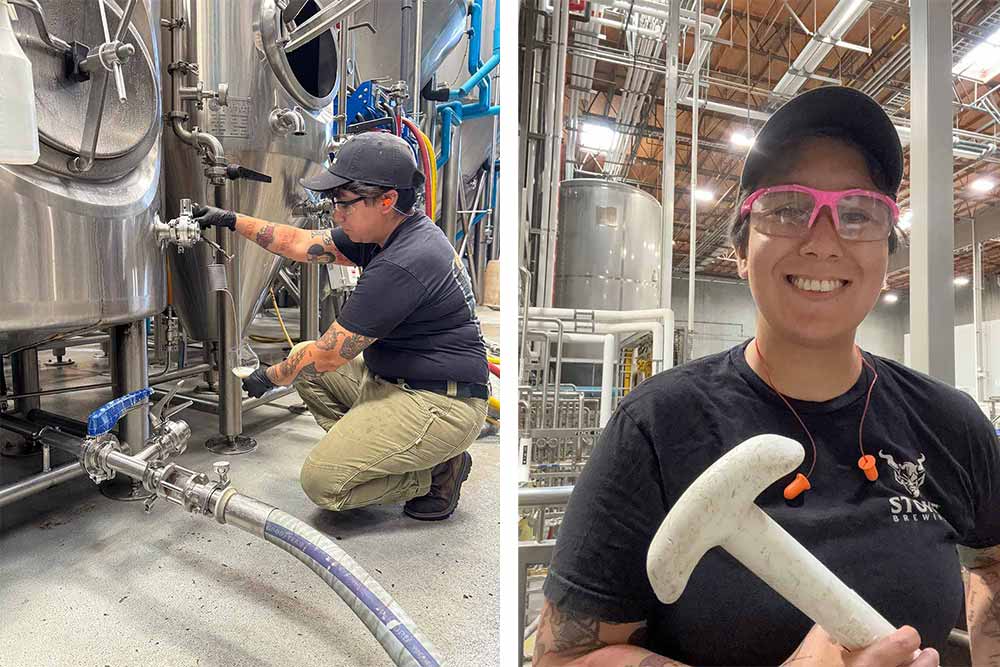
Photography provided by Fritzi Lara Lino
Grace Lee-Weitz: You mentioned that you’ve always loved beer but were hesitant to pursue it as a career at first. Why?
Fritzi Lara Lino: I thought I wanted to work in a museum and be a curator! But I found you needed a lot of schooling to be a curator. I stayed in the art realm but became disillusioned with the entire field.
GLW: That must have been tough, pursuing one career you thought was a sure thing and finding out maybe it wasn’t the best fit for you. What did you do?
FLL: I was kind of lost, but the one thing that always stayed constant was I loved going out and grabbing a beer with my best friends and now wife. Good times were always had.
GLW: When did it click for you that this thing you loved doing just as a hobby could be something more?
FLL: Growing up, I wasn’t around beer too much, to be honest, but then we moved to San Diego to be closer to my wife’s family because her mom got cancer. We wanted to spend more time with her, help take care of her, and lighten the load on my father-in-law. He also loved beer, so we started going to different breweries.
While at a brewery with my father-in-law, he said, “You know, you could make this, you could brew beer.”
That was the lightbulb moment.
GLW: Sometimes it just takes one person offering us a different perspective or asking a question to shine a light on something that seems so obvious now but we had never thought of before. How did you respond?
FLL: [I told him,] okay, let’s go take a homebrewing class.
GLW: And how’d it go?
FLL: Two hours after that class, I looked at my father-in-law and said, “I’m going to do this.” He still tells that story!
GLW: I bet! What did you love so much about that homebrewing class that made you so sure you wanted to pursue making beer as a career?
FLL: I loved not only the science behind it, but I loved the creativity. I’m a huge foodie. My wife and I travel a lot, and we’ve been fortunate to eat at some great restaurants. I’ve always loved food, drinks, and cocktails. I love that you can mix both science and creativity, and I wanted to integrate my own life experiences and travel into that.
GLW: Like what?
FLL: I’m a first-generation Mexican American, so I get a lot of inspiration from drinks like agua frescas I had growing up in East LA and Mexico or on my travels. I try to incorporate all of those nuggets of experience into every recipe I create.
GLW: Love that! But before you could do that, you had to find a job, right? With just one homebrewing class under your belt, where did you go from there?
FLL: I looked for any job I could get at a brewery—Modern Times, AleSmith, any San Diego brewery. I didn’t hear back from anyone.
GLW: Until?
FLL: Stone was looking for cellar techs. I applied to be an assistant brewer and got the position. That was 2017. Since then, I’ve just been trying to learn as much as I can.
GLW: Right, because while you’re back at Stone now, you did leave for a bit to go work somewhere else, right?
FLL: Right at the beginning of COVID, I went to Boochcraft [as a production supervisor] and stayed for two years. I wanted to acquire leadership skills and add another set of tools to my toolbox.
GLW: You’ve mentioned a few times the impact of your heritage on your career. What has it been like to work as a Queer first-generation Mexican American in the beer industry, which we all know is a predominantly white, straight, cis-male industry?
FLL: For two years, it was a lot of me feeling like I had to do more than those few brewers that still treat the industry like a boys’ club. I had to basically try to come up to their speed, which just put this fire and drive inside me to lift more hoses and get the most done.
GLW: I’m sure that shocked some people.
FLL: I’m barely 5’1”, and I’m working with these guys who are mostly six feet tall. I just wanted to physically outwork them. I wanted to run circles around them. I had to prove that I belonged and needed to earn my spot.
GLW: I can tell how passionate you are just from the way that you speak and carry yourself.
FLL: As fun as brewing is, I take it very seriously. I’m super passionate about quality and creating the best product. And I’m mindful of how I represent myself. I don’t engage in craziness outside of the brewery. I keep to myself a bit and stay out of the drama.
GLW: It seems like that strategy has paid off because I read that one of the beers you’ve made with the R&D team recently won a medal at the U.S. Open Beer Championship. How did that feel to see one of your beers earn some phenomenal recognition?
FLL: After getting a medal from the U.S. Open Beer Championship, that was a moment where I felt like people started looking at me a little bit differently. I knew I had people’s respect before because of my work ethic and how far I’ve come, but after winning that medal and receiving the scholarship, I felt people respected my opinions a bit more in the day-to-day work environment.
GLW: What beer did you make that won a medal? I’ve heard it contains some surprising ingredients.
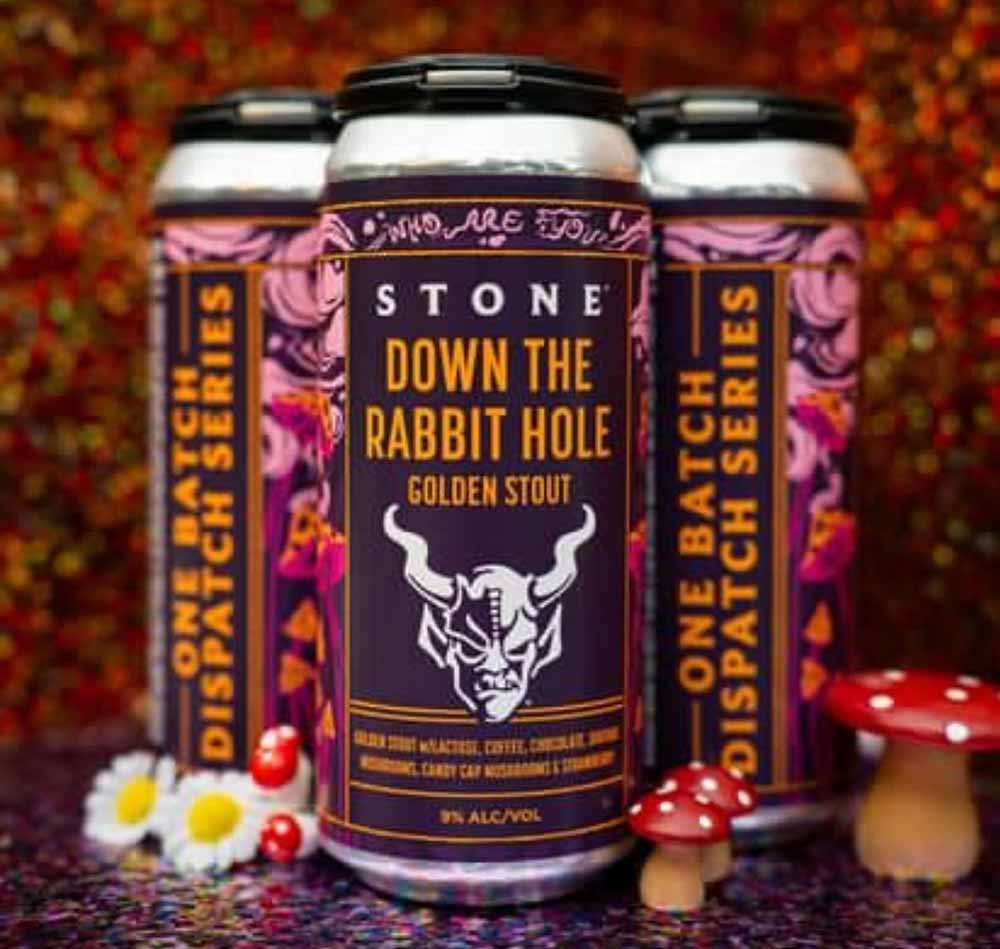
Photography courtesy of Stone Brewing
FLL: Down the Rabbit Hole, a golden stout with coffee, some strawberry powder, and lactose. But one of the big things I wanted to use was mushrooms. We used shiitake and candy cap mushrooms.
GLW: What inspired you to use mushrooms?
FLL: A trip I took out to Joshua Tree with my wife. We love going to the desert. I just have this memory of us eating s’mores by a fire outside in the beautiful Joshua Tree Desert. I wrapped all those things together. It was a beautiful memory, and up to that point, I hadn’t seen many beers with mushrooms in them. I wanted to make it work.
GLW: Sounds like you did more than just make it work!
FLL: It meant a lot to me. Actually, unbeknownst to me, Stone submitted the beer to the U.S. Open Beer Championship.
GLW: Wait, you had no idea?
FLL: I had no idea! I found out after we won a few medals. It was really, really cool. It was a full-circle moment: I do know what I’m doing; this is where I’m supposed to be; I love this career. I was just super proud, really happy, and felt validated.
GLW: Validation is everything and sometimes hard to come by. I bet it felt pretty validating to receive an MJF scholarship as well.
FLL: I’m extremely proud of myself for applying to the MJF and getting a scholarship. Just getting interviewed by Garrett [Oliver], I fangirled, but I tried not to let it show. During the interview, I couldn’t help but think I’m talking to Garrett Oliver right now! That was really cool and also a validating moment as well.
GLW: Totally, and now you’re on the verge of finishing up your Master Brewers degree at U.C. Davis. What has the program been like?
FLL: Great, but intense. I’ve learned so much, including biology, sourcing, engineering, environmental science, sustainability, and safety. It’s been really insightful and helpful. Honestly, I don’t know what I’m going to do now with all my free time.
GLW: What are some things you enjoy doing in your free time when you have it?
FLL: I have a PS5, so I like to play video games. It relaxes me and gets my mind off things.
GLW: What’s your favorite video game of all time?
FLL: Street Fighter 2. My brother and I are huge gamers, that’s something we share. Playing video games with my brother is a joy.
GLW: Any other hobbies?
FLL: My wife and I like to take little day trips out to the desert, like Palm Springs and Joshua Tree. We also love checking out the newest taproom or brewery that has opened in San Diego.
GLW: Nice! Well, hopefully, as you finish up at U.C. Davis, you’ll have some more free time for some of those hobbies. Although one theme I’ve found with all the MJF candidates we’ve spoken to is that they aren’t just content to finish their education; they all have plans to give back in some way. How do you hope to pay it forward?
FLL: I’d like to start some type of mentorship program for the LGBTQ+ community, which is very underrepresented in craft beer and the beverage space.
I would love to connect with that community that I’m very proud to be a part of and offer mentorship to anyone who just wants to chat.
I really don’t know how many of us there are out there, but every time I meet someone, there is an instant connection.
GLW: It’s totally true! And we’re everywhere, even when you sometimes can’t see us.
FLL:: Another one of those things that makes me feel like I’ve made it. Every time I have an opportunity like this, it’s awesome.

